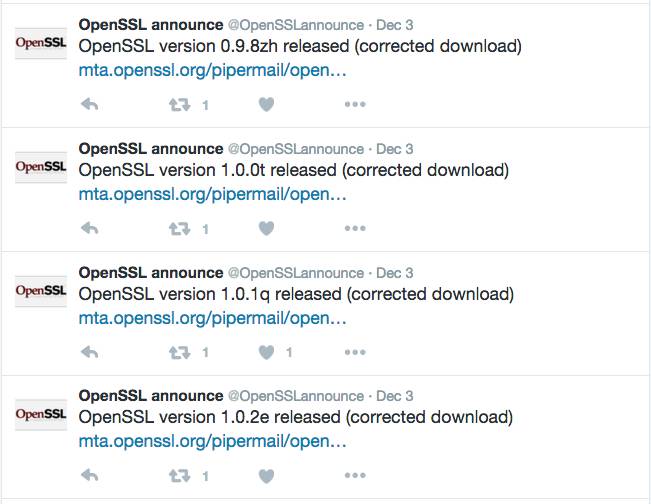This could be exploited in a Denial Of Service attack. Namely multiple clients have to choose the curve in question and the server has to share the private key among them, neither of which is default behaviour. There is a theoretical DoS risk but this has not been observed in practice on common platforms. Reported by Peter-Michael Hager. OpenSSL clients and servers are not affected.
| Uploader: | Shakakazahn |
| Date Added: | 2 July 2014 |
| File Size: | 17.94 Mb |
| Operating Systems: | Windows NT/2000/XP/2003/2003/7/8/10 MacOS 10/X |
| Downloads: | 5744 |
| Price: | Free* [*Free Regsitration Required] |
In particular this could occur if an attacker sent repeated DTLS records with the same sequence number but for the next epoch. Namely multiple clients have to choose the curve in question and the server has to share the private key among them, neither of which is default behaviour.
By opening many simulataneous connections an attacker could cause a DoS attack through memory exhaustion. Any application parsing untrusted data through d2i BIO functions is affected.
DoS openswl reachable assert in SSLv2 servers.
Index of /source/old/
Reported by Johannes Bauer. Reported by Antonio Martin. Reported by Ron Barber. These internal uses are not considered vulnerable because all calls .10.1q bounded with length checks so no overflow is possible.

Certain types of public key can take disproportionate amounts of time to process. An attacker able to trigger a memory allocation failure in that function could cause an application using the OpenSSL library to crash or, possibly, execute arbitrary code Reported by Martin Olsson, Neel Mehta.
Index of /source/old/1.0.1
Under certain circumstances, a flaw in the logic means that those messages do not get removed from the buffer even though the handshake has been completed. This would allow for messages up to 16Mb in length. By sending a large number of invalid session tickets an attacker could exploit this issue in a Denial Of Service attack.
The default maximum size for a message is k. This is no longer believed to be the case. However, for an attack on TLS to be meaningful, the server would have to share the DH private key among multiple clients, which is no longer an option since CVE This could result in a Denial Of Service attack.

However user applications that use this cipher directly and set a non-default nonce length to be longer than 12 bytes may be vulnerable. This could be used by an attacker in a denial of opwnssl attack. The bug does not occur unless this flag is set. Reported by Quan Luo.
This could still represent a security issue for end user code that calls this function directly.
However it also incorrectly allows a nonce to be set of up to 16 bytes. Inproper handling of Opsnssl representations of integers on 64 bit platforms allowed remote attackers to cause a denial of service or possibly execute arbitrary code.
Most applications have no ability to use Kerberos ciphersuites and will therefore be unaffected.
This flaw only affects multithreaded applications using OpenSSL 1. Show issues fixed only in OpenSSL 1. Therefore the attacker could force an additional k to be consumed per connection. In a DTLS connection where handshake o;enssl are delivered out-of-order those messages that OpenSSL is not yet ready to process will be buffered for later use.
/news/vulnerabilitieshtml
This has always been documented as requiring the single use. This could be exploited in a DoS attack. Our previous LTS version 1. This could be exploited by an active man-in-the-middle to downgrade connections to SSL 3. An attacker can force an error condition which causes openssl to crash whilst processing DTLS packets due to memory being freed twice.

Комментариев нет:
Отправить комментарий